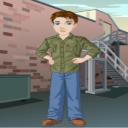Yahoo Answers is shutting down on May 4th, 2021 (Eastern Time) and beginning April 20th, 2021 (Eastern Time) the Yahoo Answers website will be in read-only mode. There will be no changes to other Yahoo properties or services, or your Yahoo account. You can find more information about the Yahoo Answers shutdown and how to download your data on this help page.
Trending News
A true or false question on what the Big Bang is really all about?
Just so we're clear, a simple true or false question:
If something continues to be measurably and observable larger as time moves forward, we know that, in the past, it must have been smaller.
15 Answers
- Anonymous10 years agoFavorite Answer
false..
Upon what fantasy are you basing that leap of logic?
- ?Lv 710 years ago
T/F questions are too limiting.
The Big Bang Theory originated after we discovered that the galaxies are flying away from each other, at greater speeds at greater distances. This means that at some time in the past (about 13.7 billion years), everything started expanding.
The Big Bang Theory is supported by extensive data. Six prominent facts are:
** The red shift of almost all galaxies, getting greater as their distance increases.
— This shows that the galaxies are flying away from each other, at greater speeds at greater distances.
** The cosmic microwave background radiation.
— This is a remnant of the radiation from the Big Bang, and has cooled over time to the exact temperature predicted.
** The variations in the cosmic microwave background radiation.
— These variations fit theoretical predictions, and were caused by quantum differences near the start of Big Bang.
** The proportions of the lightest elements and isotopes.
— This helps show that the calculations for nuclear interactions immediately following the Big Bang are correct.
** The changes in galaxies as we look further away (and thus back in time), with distant galaxies more primitive and having fewer heavy elements.
— This shows some of the changes in the universe since the Big Bang, and confirms the deep time of the universe.
** The change in the apparent speed of type 1a supernova as we look back in time, with distant supernova exploding more slowly.
— This shows that the light has been stretched out by the expansion of space over billions of years.
For more, watch the video at the 1st link - "A Universe From Nothing" by Lawrence Krauss.
-
Source(s): http://tinyurl.com/y8j6tpa http://www.godlessgeeks.com/WhyAtheism.htm#bigbang http://www.stellarhousepublishing.com/originsofchr... http://ffrf.org/legacy/about/bybarker/rise.php http://www.godlessgeeks.com/JesusExist.htm http://www.jesusneverexisted.com/source.html - kumorifoxLv 710 years ago
Sorry, but this isn't a simple true/false question.
Yes, at some point in the past, it was undeniably smaller. However, it may also have been larger and have contracted, before it started to expand again.
An example of the latter case: a star going supernova. First, the star collapses because its fuel is spent. The collapse causes it to shrink, but the pressure generated causes one final nuclear reaction to take place that blows the star to smithereens, causing the ejected matter to expand over a wider area.
- ?Lv 710 years ago
False on the "know." We can't absolutely know that it was smaller in the past; it might be fluctuating and we began to observe at the smallest point of the fluctuation. We can however deduce with a high level of certainty that it was most likely smaller in the past. So for fuzzy definitions of "know," the statement is true.
- How do you think about the answers? You can sign in to vote the answer.
- DrakeLv 510 years ago
We don't know that something was once really small because it is now getting bigger. We just know that it is larger than it was when we first started collecting data.
Still, there are other factors that lead into the theory of the Big Bang. In fact, the universe is still speeding up in its expansion. We thought it should be slowing down after the Big Bang. Something we don't understand is speeding it up.
- .Lv 710 years ago
I don't think the theory is that simple, and not everyone agrees about the theory even among its proponents. One thing that continues to mystify them is why the expansion of the universe appears to be *accellerating* which should not happen if the 'singularity to universe' model of the Big Bang is to be taken seriously.
God created the earth, everything in it and the universe in 6 days time. Whether he exclaimed "I'm knockin' it up a notch-Big BANG!" while it was happening is a matter of opinion.
- TorgoLv 710 years ago
True.
The Big Bang only explains the observation that the universe is expanding. It does not meant to explain where all of the energy and matter came from in the first place.
- Anonymous10 years ago
False.
We *hypothesize* that it must have been smaller in the past, and then we look for evidence to see if that hypothesis is correct or not. In this case, we've found a great deal of evidence that it was.
Peace.
- 10 years ago
True. There must have been a point in time when the Big Bang began. An uncontrolled explosion invariably creates chaos. Instead, we have a very ordered universe that can only be explained by an intelligent designer, God, who initiated the Big Bang.






